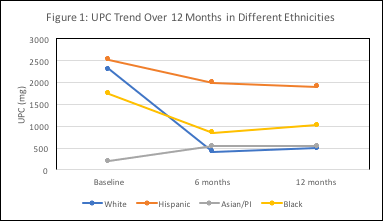Session Information
Session Type: ACR Poster Session A
Session Time: 9:00AM-11:00AM
Background/Purpose: Loma Linda University Health (LLUH) serves Riverside and San Bernardino County, which are the two largest counties by geographic size in California and make up the Inland Empire of Southern California. This underserved region of California comprises 50% Hispanic, 31.8% White, 8.7% Black, and 6.6% Asian/Pacific Islander (PI) residents. Prior studies have established differences in the incidence, clinical manifestations, and treatment response of SLE among ethnic groups. Of particular note are Hispanics, who have demonstrated greater prevalence of renal involvement and better response to certain therapies. However, the majority of these studies were conducted in Latin America and few have focused exclusively on lupus nephritis (LN). The objective of our study was to evaluate therapy management and response differences between LN patients of different ethnic backgrounds in the Inland Empire.
Methods: Data was obtained from the Southern California Lupus Registry (SCOLR), a registry that enrolled SLE patients June 2016 to June 2018 at LLUH. All LN patients were screened for inclusion. Exclusion criteria included patients with renal transplant and unknown LN class. Information obtained from the medical record included demographics, LN class, medications used, and the Systemic Lupus Erythematous Disease Activity Index 2000 (SLEDAI-2K) and urine protein-to-creatinine ratio (UPC) at baseline, 6 months, and 12 months. Simple descriptive statistical analyses were calculated to determine if observed differences were statistically significant, and a p-value ≤ 0.05 was considered significant.
Results: Thirty-five patients with LN were identified, of which there were 3 (8.6%) White, 18 (51.4%) Hispanic, 6 (17.1%) Asian/PI, and 8 (22.9%) Black. Baseline, 6 month, and 12 month SLEDAI were significantly lower in the Asian/PI cohort when compared to the other ethnic groups. In contrast, there was a trend towards higher baseline, 6 month, and 12 month SLEDAI and proteinuria levels in Hispanics when compared to the other ethnic groups (Figure 1). No significant association was found between change (between baseline and 6 months) in SLEDAI and ethnicity. All White patients had SLEDAI improvement over 6 months, while the majority of Asian/PI, Black, and Hispanic patients had no change or worsened disease activity. No association was found between medication type and ethnicity or between medication type and change in SLEDAI.
Conclusion: Asian/PI patients have significantly less disease activity whereas Hispanic patients trend towards greater disease activity than their counterparts. This study is the first endeavor to evaluate therapy management and response differences between LN patients of different ethnic backgrounds in Southern California. Further studies with greater power are needed to validate these findings.
To cite this abstract in AMA style:
Choi K, Haghshenas A, Benitez A, Salto L, Torralba K, Sandhu VK. Ethnic Disparities in Lupus Nephritis Outcomes in the Inland Empire: Findings from the Southern California Lupus Registry [abstract]. Arthritis Rheumatol. 2018; 70 (suppl 9). https://acrabstracts.org/abstract/ethnic-disparities-in-lupus-nephritis-outcomes-in-the-inland-empire-findings-from-the-southern-california-lupus-registry/. Accessed .« Back to 2018 ACR/ARHP Annual Meeting
ACR Meeting Abstracts - https://acrabstracts.org/abstract/ethnic-disparities-in-lupus-nephritis-outcomes-in-the-inland-empire-findings-from-the-southern-california-lupus-registry/

